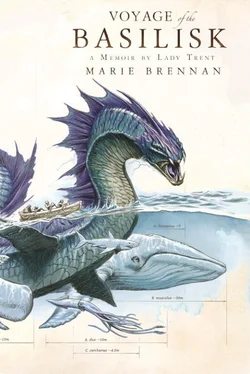“Would that I could go everywhere, ” I said. “But I’m afraid that my research requires me to expand my knowledge in breadth, rather than depth. I must devote my time to new areas and new species.”
This was true, but not the entire story. I could not tell this man about my conversation with a certain member of the Synedrion (who shall remain nameless, though he is dead now and cannot be harmed by the gossip), wherein he made it clear to me that the government would not look kindly on my ever returning to Bayembe. What precisely they feared, I cannot say; I only ever knew the one state secret about our affairs there, and it was long since out of the bag. But having thus erred once, I could not be trusted not to err again.
To my surprise, Wademi and I did not dine in the main room. He had acquired one of the private rooms for us—perhaps because that way we attracted less attention, the Yembe man and the woman once accused of betraying her country for his. The mystery of how he could afford such a thing was soon cleared up, for it transpired that he was indeed the son of Galinke’s mother’s sister. Anyone so closely linked with the oba of Bayembe, even through a lesser wife, could easily purchase me and my entire household without so much as a blink.
We passed the starter course with pleasantries, but after the main course arrived, I discovered that he had another reason for arranging this private room.
“What have you heard of the dragons?” he asked, once the waiter was gone.
“The dragons?” I echoed. My mind was so full of various draconic species that it took me longer than it should have to see his meaning. “Do you mean the ones the Moulish have given to Bayembe?”
It was not that I had forgotten them. One does not easily forget about deals one has helped broker between two foreign peoples, especially when that assistance has caused one to be accused of treason. But my interest in dragons was biological, not political; the fact that there were now Moulish swamp-wyrms in Bayembe rivers was not at the forefront of my thoughts.
Wademi nodded, and I spread my hands. “I have heard very little, really. Galinke mentioned that the eggs had been brought as promised, and then had hatched—I believe she said the total was somewhat poor, though. There were arrangements to make sure the fangfish were sufficiently fed. But nothing since then.” Which, now that I thought of it, was peculiar. Granted, the dragons in the rivers of Bayembe were intended as a defense for that country’s border, and as such might be a protected secret. But Galinke would know very well that I wanted to hear more of their progress, and could have found some way to tell me something . Instead, her infrequent letters had diverted me with other matters.
It seemed that she had indeed found a way to tell me something, and his name was Wademi n Oforiro Dara. “The situation has become… odd,” he said, “and we are hoping you can make sense of it.”
This, of course, piqued my curiosity like nothing else. “What do you mean, ‘odd’?”
He spoke slowly, in between bites of his food. I reminded myself to eat my own, though I fear the best efforts of the Salburn chefs were entirely wasted on me that day.
Wademi said, “At first it was the eggs, which did not hatch in the quantities hoped. But the Moulish brought more the next year, so we have enough now. The fangfish ate one another, and those who survived grew—some of them. Many were runts. But even those which grew are not like the dragons in the swamp. They are more slender.”
“Juveniles,” I said. “Have you asked the Moulish? They would know how long it takes to reach full maturation.”
He shook his head. “They should be fully grown now. And their hide is different; their scales are more fine.”
I could not stop myself from asking, “Are you certain it is not a skin condition?”
By way of reply, he reached beneath his mantle and brought out a small box, which he laid on the table between us. When I opened it, a strong smell of formaldehyde marred the air. The box contained a scrap of skin, which I pinched gently between my fingernails and lifted for a better view.
It was not a skin condition. I had often observed the rough, crocodilian hides of swamp-wyrms, and while they were vulnerable to disease, what illness would refine their integument? What I held in my hand was more like the skin of a fish.
Or a savannah snake. “They cannot have bred with the dragons of Bayembe,” I said. Although some of that species ventured into the fringes of the Moulish jungle, they did not go far enough in to encounter swamp-wyrms. And even if they did—and succeeded in producing viable eggs—the Moulish would not have given those eggs to the oba. They had a very rigorous process for breeding their dragons, which involved taking the males of the swamp proper to the lake where the queens swam.
My fingernails pinched tighter on the skin. The queens…
I had not learned as much about swamp-wyrm biology as I would have liked. I knew that the Moulish took the eggs after their laying and distributed them about the swamp, and I knew that the different incubation of the eggs encouraged some to develop into queens, while the rest remained male. (At the time I suspected, but had not had a chance to prove, that some of the “males” were either neuter or infertile females. Neuter sex was known in other draconic types, and I had a sense that only some of the wyrms in the swamp were eligible to breed with the queens. But I had not gotten to examine enough dragons at sufficiently close range to be certain.)
My head was awhirl with these thoughts and others, various theories and observations colliding in untidy ways. What emerged from the scrum was this: what if the transplantation of the eggs to the rivers of Bayembe had produced queens instead of males?
My observations of the queen dragons had all been at quite a distance, so I was only speculating that their hides featured such fine, overlapping scales. It made sense, though. They swam in the turbulent waters of the lake below the Great Cataract, where they would benefit from a more streamlined surface.
But if that were the case, why had the Moulish not said anything to the Yembe?
Because they did not want the existence of the queens known. The oba would certainly try to trade for one, and if that failed, he might well try to take one by stealth or force. Or, if he learned enough of the incubation procedures, try to mimic them so that he might breed his own dragons, without needing to rely on the Moulish.
Which left me in rather a pickle. If my theory could be correct, then I desperately wanted confirmation. Moreover, Wademi—and through him, Galinke and all her people, half-brother included—were looking to me for aid. But it would not very well repay my Moulish friends if I spilled a secret they were trying to keep.
I laid the skin back in its box. “I am not certain what to say. It may be a response to the cleaner, fresher environment of the rivers; swamp water is very full of silt and organic matter, which I imagine is quite an irritant to the skin of the young dragons.” Certainly it had been an irritant to my own hide. “Do your dragons seem healthy?”
“For the most part,” Wademi said.
“I should like to know if they keep growing,” I said. “Some fishes change size according to their environment; it is possible that your dragons will grow larger than those in the swamp, because of the more open waters.” If they grew to more than four meters in length, that would tell me a great deal. The queens, from what I had seen of them, were much larger than the males.
Wademi made the humming noise that, among the Yembe, stood in for the refusal it would be rude to state directly. I thought about our private room, and Galinke’s reticence in her letters. He had invited me to lunch so as to convey information they did not want committed to paper. (It did not occur to me until some months later that someone in Scirland might even be reading my mail. If they did not want me going to Bayembe, they might have an interest in the letters I sent to and received from there. To this day, I do not know if it was so.)
Читать дальше












